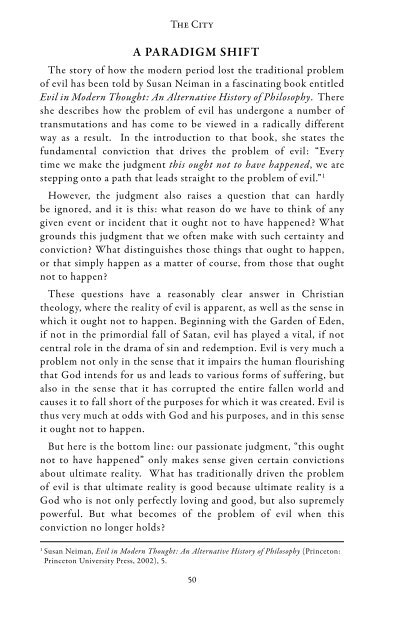THE CITY
h6c7p5d
h6c7p5d
You also want an ePaper? Increase the reach of your titles
YUMPU automatically turns print PDFs into web optimized ePapers that Google loves.
The City<br />
A PARADIGM SHIFT<br />
The story of how the modern period lost the traditional problem<br />
of evil has been told by Susan Neiman in a fascinating book entitled<br />
Evil in Modern Thought: An Alternative History of Philosophy. There<br />
she describes how the problem of evil has undergone a number of<br />
transmutations and has come to be viewed in a radically different<br />
way as a result. In the introduction to that book, she states the<br />
fundamental conviction that drives the problem of evil: “Every<br />
time we make the judgment this ought not to have happened, we are<br />
stepping onto a path that leads straight to the problem of evil.” 1<br />
However, the judgment also raises a question that can hardly<br />
be ignored, and it is this: what reason do we have to think of any<br />
given event or incident that it ought not to have happened? What<br />
grounds this judgment that we often make with such certainty and<br />
conviction? What distinguishes those things that ought to happen,<br />
or that simply happen as a matter of course, from those that ought<br />
not to happen?<br />
These questions have a reasonably clear answer in Christian<br />
theology, where the reality of evil is apparent, as well as the sense in<br />
which it ought not to happen. Beginning with the Garden of Eden,<br />
if not in the primordial fall of Satan, evil has played a vital, if not<br />
central role in the drama of sin and redemption. Evil is very much a<br />
problem not only in the sense that it impairs the human flourishing<br />
that God intends for us and leads to various forms of suffering, but<br />
also in the sense that it has corrupted the entire fallen world and<br />
causes it to fall short of the purposes for which it was created. Evil is<br />
thus very much at odds with God and his purposes, and in this sense<br />
it ought not to happen.<br />
But here is the bottom line: our passionate judgment, “this ought<br />
not to have happened” only makes sense given certain convictions<br />
about ultimate reality. What has traditionally driven the problem<br />
of evil is that ultimate reality is good because ultimate reality is a<br />
God who is not only perfectly loving and good, but also supremely<br />
powerful. But what becomes of the problem of evil when this<br />
conviction no longer holds?<br />
1<br />
Susan Neiman, Evil in Modern Thought: An Alternative History of Philosophy (Princeton:<br />
Princeton University Press, 2002), 5.<br />
50


